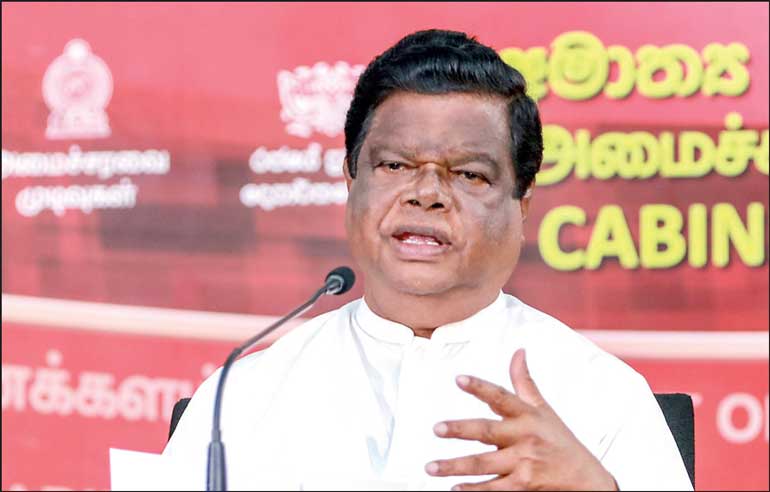Monday Feb 23, 2026
Monday Feb 23, 2026
Wednesday, 24 July 2024 00:10 - - {{hitsCtrl.values.hits}}

Cabinet Co-Spokesman and Minister Bandula Gunawardena
By Charumini de Silva
In a significant move, the Cabinet of Ministers on Monday approved making a public apology to communities affected by the compulsory cremation policy enacted during the COVID-19 pandemic and instructed Legal Draftsman to prepare a Bill for the introduction of new burial law.
“The decisions follow recent studies and comes amid efforts to prevent future conflicts regarding the disposal of bodies,” Cabinet Co-Spokesman and Minister Bandula Gunawardena yesterday said at the post-Cabinet meeting media briefing.
He said firstly, the Government will make a public apology and will announce practical measures later.
“It is a formal apology from the Government to all communities affected by the compulsory cremation at a policy level,” he explained.
During the height of the COVID-19 pandemic, the Health Ministry recommended cremation as the method for disposing of bodies of those who died from the virus.
“This guideline led to the cremation of 276 deceased Muslims, despite the community’s religious practices which favour burial,” he said.
The policy, implemented due to fears of water contamination by the virus, caused significant distress and sparked heavy criticism among various religious groups and human rights activists.
Two critical studies were conducted to investigate the validity of these fears. The first, conducted in July 2021 by the Water Supply Ministry in collaboration with the University of Jayawardenapura, tested water in Colombo and Kandy including river water, hospital wastewater and other potential sources of contamination. The results showed no presence of the SARS-CoV-2 virus in surface water.
The second study, completed in March 2024 by the China-Sri Lanka Joint Research and Demonstration Centre for Water Technology, focused on virus transmission to water resources, including groundwater. The findings confirmed that while faeces and urine are primary transmission sources, safe burial does not pose a risk of virus transmission to water sources.
In light of these findings, the Cabinet of Ministers approved a joint proposal presented by Justice, Prison Affairs and Constitution Reforms Minister Dr. Wijeyadasa Rajapakshe, Foreign Affairs Minister Ali Sabry and Water Supply and Estate Infrastructure Development Minister Jeevan Thondaman.
Separately, the Cabinet approved another new legislation allowing families to choose between burial and cremation based on personal or religious preferences, aiming to ensure such conflicts do not arise in future health crises.
The Government is also considering laws to facilitate the donation of bodies to medical faculties if deemed necessary.
Gunawardena highlighted the importance of addressing past grievances to foster national unity and heal community wounds. “The new legislation will respect the diverse religious practices in Sri Lanka and ensure that such distressing incidents are not repeated,” he added.
The joint proposal presented by the Justice, Prison Affairs and Constitution Reforms Minister Dr. Wijeyadasa Rajapakshe and Foreign Affairs Minister Ali Sabry to instruct Legal Draftsman to prepare a Bill for the introduction of the new law.